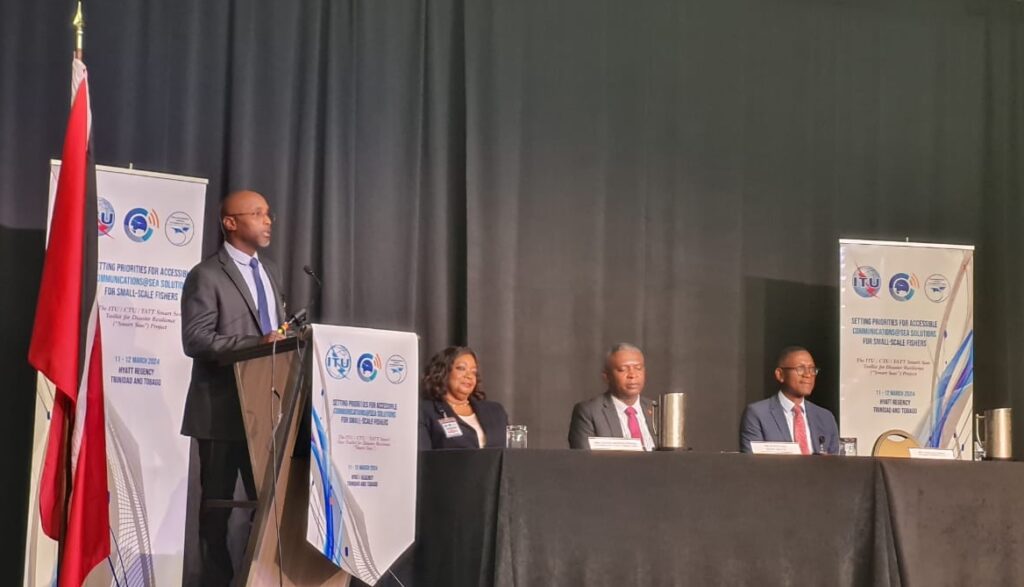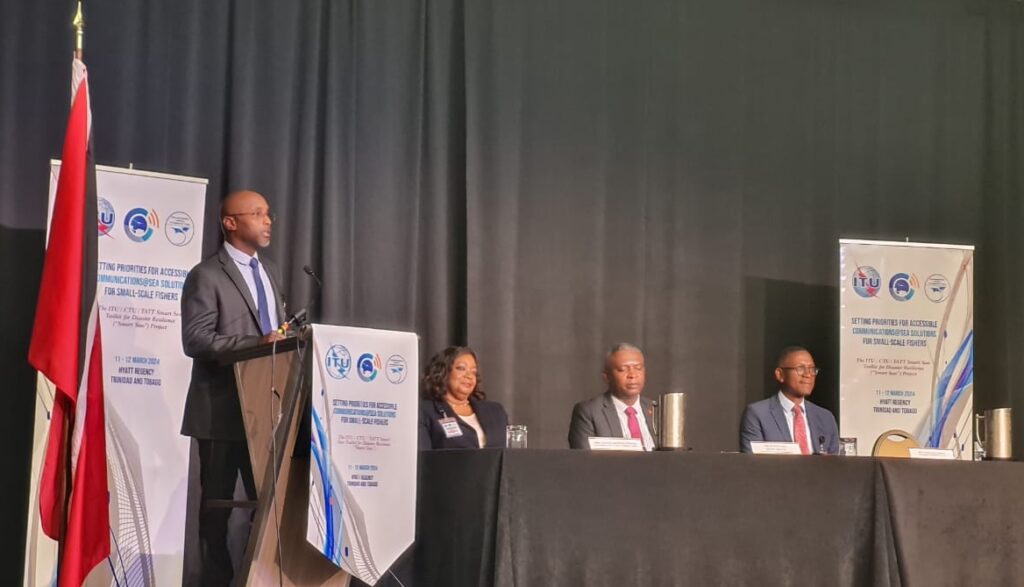Project by ITU/CTU/TATT Smart Seas Toolkit for Disaster Resilience
11th March 2023

Ladies and gentlemen, distinguished guests, and valued partners, good morning!
If you have ever visited any of the coastal and fishing communities in Trinidad and Tobago such as Icacos Point, overlooking Columbus Channel onto the Venezuelan coast, you would see small scale fishers in action. Or you could go to Charlotteville, Buccoo, or Speyside if you find yourself in Tobago.
You could also do the same in Oistins, or Martin’s Bay where I go fishing when in Barbados. The same goes for St. Georges in Grenada and for Kingstown in St. Vincent and the Grenadines. Small scale fishers, hard at work. It is an amazing, rewarding but also a dangerous job!
These fishers, essential stewards of our marine resources, confront a myriad of hurdles in their daily pursuits. From limited access to resources and inadequate infrastructure to unpredictable weather patterns, their journey is fraught with uncertainty. Moreover, the risk of disaster at sea looms large, underscoring the urgent need for proactive measures to enhance safety and resilience within this vulnerable community.
Furthermore, as custodians of our marine ecosystems, we must recognize the imperative of sustainable fishing practices. The health and vitality of our oceans are inextricably linked to the long-term viability of our fishing industry. Therefore, our efforts to enhance safety at sea must be complemented by a steadfast commitment to responsible and sustainable fishing practices that safeguard the delicate balance of marine life for generations to come.
I began my brief remarks speaking about the fishing communities in the Caribbean and their vulnerabilities and also about safe and sustainable practices because it is incumbent upon us to remain focussed on the big picture and understand that this project goes beyond the use of ICTs for small scale fishers.
That is why the CTU is pleased to be a part of this initiative which aims to reduce the vulnerability of this group of stakeholders and build a more resilient community across the region.
The Smart Seas Toolkit for Disaster Resilience project marks a crucial step forward in safeguarding the lives and livelihoods of those who brave the open waters, anchoring their existence in the rich maritime heritage of our region.
Through the strategic integration of information and communication technology (ICT), we seek to empower small-scale fishers with the tools and knowledge necessary to communicate effectively in the event of a maritime emergency. We endeavor to bridge the communication gap and ensure swift response and assistance during times of crisis.
In this endeavor, we are not only fulfilling our national obligations under the International Telecommunication Union (ITU) Radio Regulations (RRs) but also advancing a collective vision of a thriving and resilient maritime sector. Compliance with maritime reporting requirements for Coast Stations, is paramount to ensuring efficient and coordinated maritime communication and search and rescue operations.
It was therefore unfortunate that, before we started this project, 90% of CTU member states had never fulfilled national obligations under the ITU RRs with respect to maritime reporting of Coast Stations. However, the project has facilitated the fulfilment of Trinidad and Tobago’s notifications and is currently in the process of doing the same for Barbados, Grenada, St Vincent and the Grenadines, as well as Belize. This figure has therefore moved down to 85%. Its moving in the right direction but there is still significant work to be done as a matter of urgency!
I am thankful for the productive and ongoing partnerships that have brought us to this point today. The ITU has been a steadfast partner and a key stakeholder in the Caribbean digital space. Hence, we have extended an invitation to the Director of the Bureau of Telecommunications Development (BDT), Dr. Zavazava, to participate in our upcoming Ministerial Retreat in Belize in April, an invitation he has graciously accepted. It will be an important meeting as we seek to develop a new strategic plan for the CTU.
TATT has also been an indispensable partner to the CTU, supporting not only this project, and others such as ICTs for All, but also very recently supporting the participation of a young radio engineer, Tariq Mohammed, who incidentally has been a key resource on this project, to attend the World Radio Conference in 2023 in Dubai, in support of the Caribbean delegation. Thank you TATT!
It is our intention to leverage the knowledge gained from this experience to enhance the participation of our young people and women in the Caribbean in the radio communications sector and to strengthen our regional network of experts in the field.
I am pleased to see the inclusion of the United Nations Early Warnings for All initiative as this is also an important component in promoting safety at sea. We will continue to support these initiatives primarily through the Caribbean Spectrum management Task Force promoting legal and regulatory compliance to international standards and policies. We look forward to the Report for accessible comms@ sea for Small Scale Fishers following this 2-day workshop.
In closing, I again extend my deepest gratitude to all our partners and stakeholders for their unwavering support and dedication to this cause. Together, let us chart a course towards a safer, more sustainable, and prosperous future for all who depend on the sea for their livelihoods, by extension, that would be ALL of us here in the Caribbean.
Ladies and gentlemen, I thank you.


